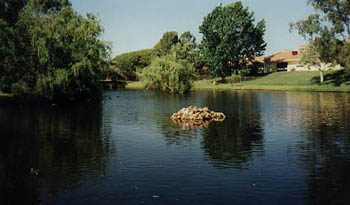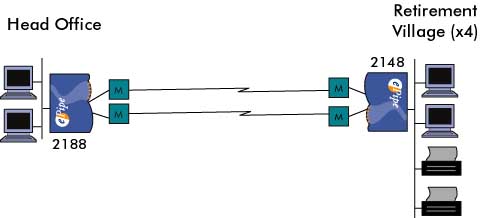Customer Story: RAAF Association of Western Australia
 About
The RAAF Association
About
The RAAF Association
The RAAF Association (RAAFA ) operates
a network of retirement villages and aged care facilities in Western Australia.
As with any organisation with multiple sites, RAAFA faced the challenge of
networking these sites together and distributing applications throughout the
operation.
 Left:
The RAAFA’s Dean Lodge reitrement village fronting Lake Howard in Perth, WA
Left:
The RAAFA’s Dean Lodge reitrement village fronting Lake Howard in Perth, WA
Perth-based systems integrator De Gruyter
Haine was approached to deliver a solution. To minimise the administration
overhead, a thin client solution was chosen, running Windows Terminal Server
and Microsoft Exchange Server running on an Intel-based server in the head
office. RAAFA also invested in KCS, a specialised accounting solution for
Aged Care facilities, which is distributed to each of the facilities over
casual-dial-up connections.
The Networking Challenge
De Gruyter Haine quickly realised that casual dial-up connections would
not give RAAFA the performance they needed to deploy the solution efficiently.
“The performance of KCS over a single dial-up connection was as slow as knitting
jumpers,” commented Steve Appleton, technical director with De Gruyter Haine.
Another problem RAAFA experienced with their dial-up links was line drop-out.
“A resident (often frail-aged) would come to the office to pay an account.
The office worker would enter the payment into the system, but before a receipt
could be printed, the line would drop out. It often took several minutes to
complete a transaction. The resulting delays resulted in poor customer service
and low work productivity. We had to find an alternative,” he added.
De Gruyter Haine researched several alternatives, all of which involved
an outlay of tens of thousands of dollars in infrastructure and telecommunications
charges. De Gruyter Haine then considered ePipe.
The ePipe Solution
Because of the relatively low-bandwidth demands of the thin-client based
solution, an ePipe 2148 was placed in the office of each site, with two dial-up
connections used to communicate with the head office. The links share the
traffic load, but when a large print run is being processed, the second link
is still available for keyboard and terminal traffic. RAAFA also purchased
the Direct Connection Services (DCS) feature set with each ePipe unit, enabling
the direct dial connections between each site.
“The difference in performance was immediate and striking. By separating
the types of traffic between two dial-up connections, the slow response times
became a thing of the past. However, the real advantage was the way ePipe
handled the multiple connections. If a line did drop out, ePipe transparently
re-established it without any intervention by staff,” Appleton said.

Beyond these performance advantages, there was an even bigger benefit to
implementing ePipe across the network. “By eliminating the need for ISDN,
I estimate that ePipe has already saved RAAFA over $100,000 in telecommunications
costs alone. Moreover, because ePipe works so well with standard dial-up connections,
these savings are increasing all the time. It has been the perfect solution
to RAAFA’s needs,” Appleton said.

about ePipe | products
| solutions | support
| information center | contact
us
Copyright © 2002 ePipe Pty. Ltd. All rights reserved.

 About
The RAAF Association
About
The RAAF Association Left:
The RAAFA’s Dean Lodge reitrement village fronting Lake Howard in Perth, WA
Left:
The RAAFA’s Dean Lodge reitrement village fronting Lake Howard in Perth, WA

![]()